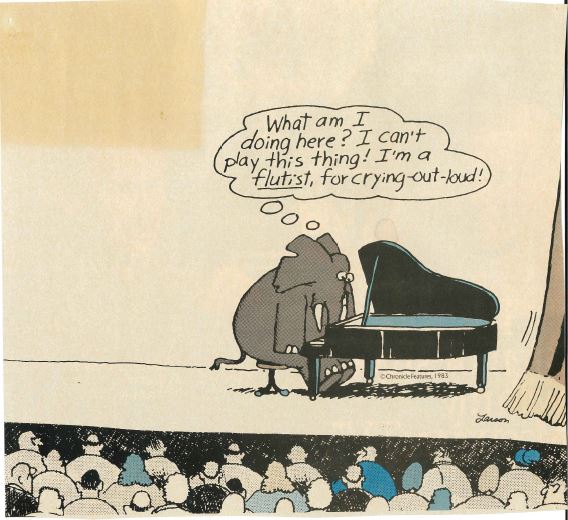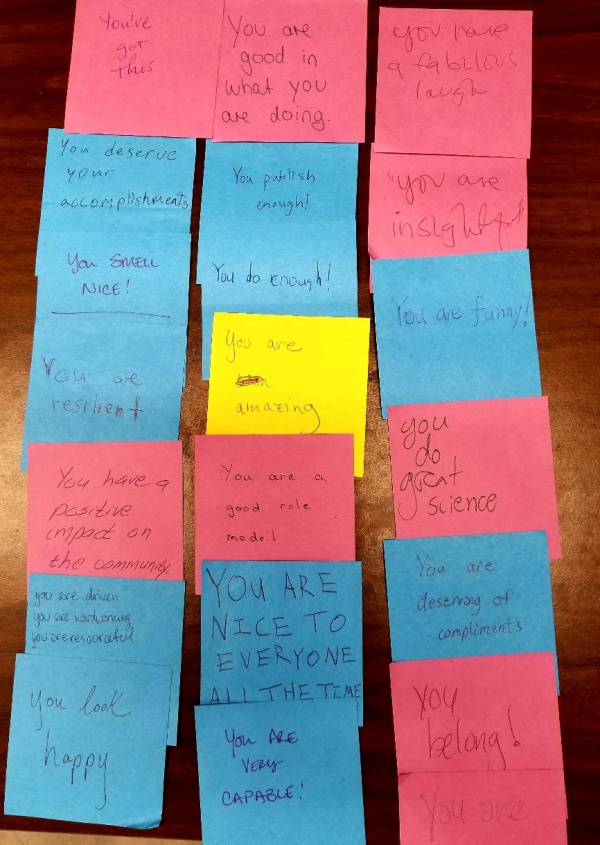Summary of the 2018 LPSC WiPS Event: Overcoming Impostor Syndrome
A huge thanks to everyone who organized, presented at, and attended the 10th Annual LPSC Women in Planetary Science Networking event! The evening was a great discussion forum, and here we present some stories and summary strategies for combating impostor syndrome.
Example story – Imposter Syndrome in Graduate School:
There, I laid on my bed 8 consecutive days, not knowing how to place my feet on the ground and start my day. Eight days before, I was notified that I had passed my written comprehensive exam. This exam had haunted me for two years, through the course-work, through night and day, and day and night, in family vacations and in moments of solitude. I had passed this exam. However, instead of the joy and relief that news could have brought to me, it brought me immense sadness and unworthiness. My governing thought was they pitied me, they just passed me and I don’t have any right to be here because soon, they will figure out I am a fraud.
Ten days later, I called the counseling and testing center and was told about Impostor Syndrome, and was offered some self-compassion tips to deal with this.
This story is not atypical, and fortunately this student was able to receive some help, but many of us go through these types of feelings to variable degrees and with variable degrees of support.
The event started with Dr. Nicolle Zellner’s introduction about Dr. Susan Neibur and her contribution to the world as a scientist, mother, and wife. Dr. Carle Pieters shared a cartoon about Impostor Syndrome (See Fig: 1).

Figure 1 Cartoon sent by Dr. Carle Pieters
Dr. Christina Richey was the guest speaker at the event and right away established a connection with her audience by sharing that despite her uneasiness before the Masursky Lecture, she pulled through it triumphantly and used the opportunity to raise awareness about harassment.
Dr. Richey made the audience aware of her tenacious journey about being the first generation doctorate from her family and how it had made her feel lonely and sometimes like an impostor on that path. She conveyed that, despite her endurance, sometimes personal comments would belittle her capabilities and courage. Sharing her vulnerability she connected with the audience and then drove us to the question of Why do we feel like an impostor? People act surprised when you are great and advise you to lower your ambitions, which then results in less satisfaction, over-preparation and worry, or asking for less money than what is entitled. In short, the answer is: because people treat you like one.
The workplace climate survey results from Dr. Richey’s group’s work actually highlight this (https://agupubs.onlinelibrary.wiley.com/doi/full/10.1002/2017JE005256): When we experience hostility in the workplace, and feel unsafe as a result, we skip professional events. It’s difficult to ‘belong’ when you’re not in the room, or overhearing people say negative things that can make you want to not be in the room. This difficulty is amplified for women of color and others who are marginalized in multiple ways.
With that prologue Dr. Richey moved us to a game created by Dr. Sarah Ballard for her own workshop on the topic (http://www.drsarahballard.com/impostor/) called ‘2 Truths/1 Lie’: the audience shared two instances when they had to truthfully deal with Impostor Syndrome and make-up one occasion. The common reaction was the audience’s disbelief and hope that all or few of the instances were not true.
The next activity we did as a group was from The Ada Initiative workshop (http://adainitiative.org) and included writing the compliments we would wish to receive on post-it notes and handing it to someone else (which was a twist from the original workshop’s framework of this activity, but worked for the audience of this event). Getting to read the compliment you wish to be offered back to you was a heart-warming experience. ‘Your paper was great!’, ‘You are right!’, ‘You deserved the award you got!’, ‘You are extraordinary’ are just a couple of compliments exchanged by the audience. While I gave a “You are smart and intelligent” compliment, I received an “It’s a joy to work with you” compliment. If these haven’t warmed your hearts yet, the event had more uplifting moments.
Rajani Dhingra contributed the following first hand account of the event activities and conclusions:
Dr. Richey raised an insightful question to ponder upon after post-it-ting (See Fig: 2) our compliments we wish to receive, “What do we value when we give compliments?”
A couple of answers that stood out to me were — gratitude or gratefulness, a clarity of who I am and what I value, an understanding of oneself and the people around—that are all integral to science and humanity.
Dr. Richey’s presentation was followed by a discussion that led us to think about solutions. A simple action of taking a step back and slipping into a confidant’s shoe might keep the negative self-talk at bay from affecting our self-esteem.

Figure 2: The post-it notes that the audience shared with each other as compliments. Go ahead! Make it your desktop background as I did for a constant reminder on how awesome you are!
Below are just a few of the possible solutions we discussed for a ready referral in the moments you need self-compassion the most.
- Talk about the issue with someone you trust.
- Ask your friends what they think of you: Invest in a positive working relationship with someone/colleagues.
- Use your own words to influence how you think: Put self-motivating stickers in places you frequent or see yourself (i.e., a mirror in the bathroom).
- Teach others about your field: It is gratifying and helps your self-worth and self-esteem.
- Ask questions: Get courageous and ask!
- Build Alliances: Twitter, Instagram, Facebook
- Own your accomplishments!
- Re-orient yourself around your values: Inner harmony. Do things that focus on your values daily.
- Take the risk.
- Provide empathy that you offer to other people to yourself AND treat yourself like you would treat your best friend. Practice self-compassion.
- When you think you don’t deserve the opportunity, think about what you can do with the opportunity.
- Don’t project other’s assumption of your work.
I believe self-compassion is a journey that one is always en-route. There is no destination to this journey because however hard you practice, there will be times when you will dissuade yourself. So once you set yourself on this path and promise compassion and kindness to self; no matter what, take a step back and start combating the negative thoughts around you:
- Encourage the people around you.
- Discourage hostility and bickering.
- Eliminate hidden barriers to participation.
- As a leader, share your uncertainties and demonstrate your own learning process. Feel free to own your mistakes.
- Mentoring others is a big job, but you have valuable information to share.
As for me, I learnt that apart from many successful people I adore (Neil Armstrong, Albert Einstein, and Maya Angelou), the people I meet on a day-to-day basis (my colleagues, co-workers and seniors, I hope to collaborate with) might be my path-mates on my journey to embrace the courage to be imperfect and still feel complete! This realization brought me a sense of belongingness to this community – Wo/men in Planetary Science!
More information can be found at AccessSTEM resources https://washington.edu/doit/programs/accessstem/accessstem-resources
For other images of the event https://www.flickr.com/photos/lunarandplanetaryinstitute/sets/72157692999633311/
This year’s organizers were:
Dr. Nicolle Zellner, Dr. Sarah Noble, Dr. Zibi Turtle, Dr. Jennifer Piatek, Dr. Jennifer Grier, Dr. Barbara Cohen, Mallory Kinczyk, Dr. Kelsi Singer, and Rajani Dhingra
Thanks to Rajani Dhingra for taking notes and providing this fabulous summary of the event!



Wow! Thank you for sharing.
Such a great summary! You go All! 🙂